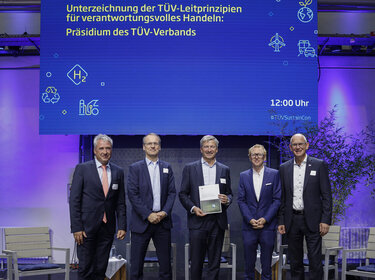Berlin, 28 March 2022 - The TÜV Association calls for the implementation of binding sustainability criteria for products in the European Union. Requirements regarding durability, repairability, recyclability and environmentally friendly disposal must be taken into account from the product design stage onwards. Compliance with these requirements should be assessed by an independent body in order to avoid greenwashing by companies. In addition, products should be marked with a clear EU-wide label based on well-established certification marks. "Consumers should be able to easily identify which products are recyclable and whether they already contain recycled materials," says Juliane Petrich, Head of Politics and Sustainability Executive Officer. "Sustainability by Design should be extended as a basic principle to as many product categories as possible, for example electrical appliances such as smartphones or tablets, furniture, textiles or building materials." The development of generally recognised assessment criteria and the involvement of independent third parties are necessary to ensure that the legal requirements are complied with.
On 30 March 2022, the European Commission will present its Sustainable Products Initiative (SPI). It aims to ensure that all products placed on the European single market are as sustainable, durable, reusable, repairable, recyclable and energy-efficient as possible. The initiative is a measure of the Action Plan for a European Circular Economy The TÜV Association strongly approves of the SPI for sustainable products. Petrich: "With this EU initiative, we can consistently integrate environmental and climate protection into economic activity." In its current position paper "Circular Economy “Made in Europe””, the TÜV Association formulates political recommendations on how a sustainable transformation can succeed.
Create binding sustainability requirements
A circular economy offers many advantages for companies as well. "Made in Europe" can become a real promise for value and quality in the context of the circular economy and strengthen the competitiveness of European companies in international comparison. "Europe can become a pioneer for resource-saving and high-quality circular product solutions, technologies and business models," says Petrich. "Binding sustainability requirements support manufacturers to develop products that last longer, are of higher quality and are made of recovered or recyclable materials." However, the focus should not only be placed on stipulating binding sustainability criteria but also on establishing effective enforcement mechanisms. Independent conformity assessment bodies can ensure that circular economy requirements are actually implemented. Certification marks issued by independent bodies help inform consumers which products are suitable for recycling or contain a minimum proportion of recycled materials.
Reduce the amount of waste
The drastic reduction of waste is a central goal in a circular economy. The use of recyclable materials will therefore play an important role in the future. However, consumers will only accept recycled materials if the same requirements apply to their use as to virgin materials. "A two-tier system of virgin and recycled materials must not be allowed to arise," says Petrich. "In particular, requirements for the quality of the processes and the resulting recyclates should therefore be legally defined and independently assessed."
In addition, digital technologies must play a greater role in a well-functioning circular economy. Digitalisation offers numerous opportunities, for example as regards more efficient waste separation or innovative business models that open up usage paths beyond the individual ownership of products. There is the need to make the ecological and social footprint of digital technologies as small as possible. "In particular electrical devices break too quickly or are designed to have a lifespan of only two to three years," says Petrich. "To effectively prevent electronic waste in the future, the technology industry itself must be committed to a sustainable product design."

![TÜV Association calls for binding product sustainability requirements [Translate to Englisch:]](/fileadmin/_processed_/0/6/csm_possessed-photography-JG80MshfiHo-unsplash-nachhaltigkeit-muell-recycling-kreislaufwirtschaft_c3008ed6ac.jpg)

